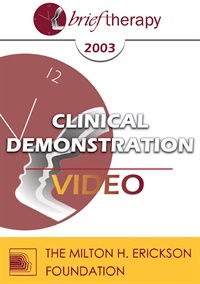
- Average Rating:
- Not yet rated
- Topic Areas:
- Clinical Demonstrations | Psychotherapy | Brief Therapy | Meditation, Spirituality and Yoga | Resources
- Categories:
- Brief Therapy Conference | Brief Therapy Conference 2003
- Faculty:
- Stephen Gilligan, PhD
- Course Levels:
- Master Degree or Higher in Health-Related Field
- Duration:
- 51:51
- Format:
- Audio and Video
- Original Program Date:
- Dec 12, 2003
- Short Description:
- Educational Objectives: 1) To describe how therapists can connect clients to a calm, centering inner state. 2) To describe how connection to the inner self can allow new resources and solutions to develop.
- Price:
- $59.00 - Base Price
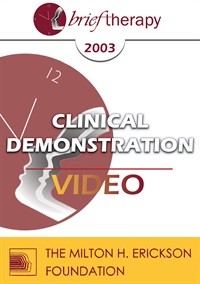
- Average Rating:
- Not yet rated
- Topic Areas:
- Clinical Demonstrations | Attunement | Brief Therapy | Therapist Development
- Categories:
- Brief Therapy Conference | Brief Therapy Conference 2003
- Faculty:
- Pat Love, EdD
- Course Levels:
- Master Degree or Higher in Health-Related Field
- Duration:
- 52:00
- Format:
- Audio and Video
- Original Program Date:
- Dec 12, 2003
- Short Description:
- 1) To describe the clinical effectiveness of attunement. 2) Given a case, integrate the importance of attunement in clinical practice.
- Price:
-
Sale is $29.00
price reduced from Base Price - $59.00
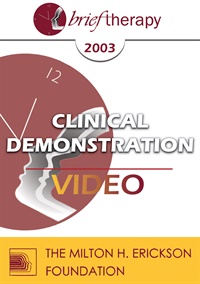
- Average Rating:
- Not yet rated
- Topic Areas:
- Clinical Demonstrations | Solution Oriented Approach | Supervision | Brief Therapy
- Categories:
- Brief Therapy Conference | Brief Therapy Conference 2003
- Faculty:
- Yvonne Dolan, MA
- Course Levels:
- Master Degree or Higher in Health-Related Field
- Duration:
- 49:02
- Format:
- Audio and Video
- Original Program Date:
- Dec 12, 2003
- Short Description:
- Educational Objectives: 1) To identify two practical questions that are useful for solution- focused supervision. 2) To identify two criteria for maximizing therapist effectiveness through supervision.
- Price:
-
Sale is $29.00
price reduced from Base Price - $59.00
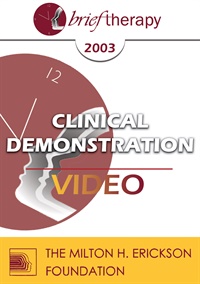
- Average Rating:
- Not yet rated
- Topic Areas:
- Clinical Demonstrations | Hypnosis | Brief Therapy
- Categories:
- Brief Therapy Conference | Brief Therapy Conference 2003
- Faculty:
- Michael Yapko, PhD
- Course Levels:
- Master Degree or Higher in Health-Related Field
- Duration:
- 56:22
- Format:
- Audio and Video
- Original Program Date:
- Dec 12, 2003
- Short Description:
- Educational Objectives: 1) To describe how hypnosis may enhance problem solving. 2) To describe how hypnosis may serve as a vehicle for building expectations of success.
- Price:
-
Sale is $29.00
price reduced from Base Price - $59.00
Tags: Hypnosis Brief Therapy
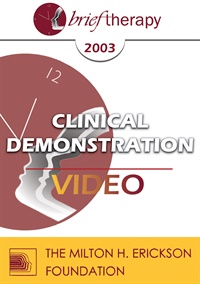
- Average Rating:
- Not yet rated
- Topic Areas:
- Clinical Demonstrations | Panic | Brief Therapy | Strategic Therapy
- Categories:
- Brief Therapy Conference | Brief Therapy Conference 2003
- Faculty:
- Reid Wilson, PhD
- Course Levels:
- Master Degree or Higher in Health-Related Field
- Duration:
- 1:00:14
- Format:
- Audio and Video
- Original Program Date:
- Dec 12, 2003
- Short Description:
- Educational Objectives: 1) To describe framing the treatment approach with a client with panic disorder. 2) To describe interoceptive exposure within the initial interview.
- Price:
-
Sale is $29.00
price reduced from Base Price - $59.00
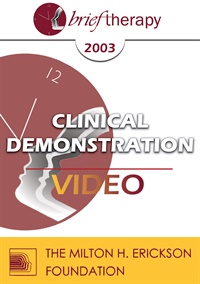
- Average Rating:
- Not yet rated
- Topic Areas:
- Clinical Demonstrations | Belief Systems | Brief Therapy
- Categories:
- Brief Therapy Conference | Brief Therapy Conference 2003
- Faculty:
- Robert Dilts, BA
- Course Levels:
- Master Degree or Higher in Health-Related Field
- Duration:
- 1:02:04
- Format:
- Audio and Video
- Original Program Date:
- Dec 12, 2003
- Short Description:
- Educational Objectives: 1) To describe one method to help clients develop new perspectives with respect to limiting beliefs and assumptions. 2) To describe how to lead clients to reflect on themselves from different time frames and perceptual positions.
- Price:
-
Sale is $29.00
price reduced from Base Price - $59.00
Tags: Belief Systems Brief Therapy
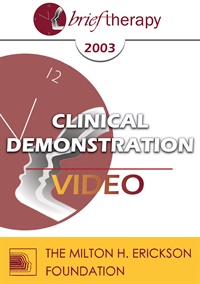
- Average Rating:
- Not yet rated
- Topic Areas:
- Clinical Demonstrations | Pain and Healing | Brief Therapy | Hypnosis | Trance
- Categories:
- Brief Therapy Conference | Brief Therapy Conference 2003
- Faculty:
- Stephen Lankton, MSW
- Course Levels:
- Master Degree or Higher in Health-Related Field
- Duration:
- 59:27
- Format:
- Audio and Video
- Original Program Date:
- Dec 12, 2003
- Short Description:
- Educational Objectives: 1) To describe the use of three trance phenomena in the reduction of pain. 2) To describe how hypnosis for pain control can be introduced in brief therapy.
- Price:
-
Sale is $29.00
price reduced from Base Price - $59.00
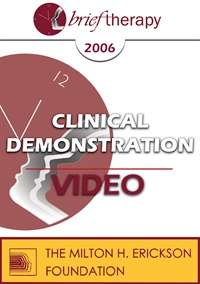
- Average Rating:
- Not yet rated
- Topic Areas:
- Clinical Demonstrations | Redecision Therapy | Brief Therapy | Psychotherapy
- Categories:
- Brief Therapy Conference | Brief Therapy Conference 2006
- Faculty:
- Mary Goulding, MSW
- Course Levels:
- Master Degree or Higher in Health-Related Field
- Duration:
- 59:03
- Format:
- Audio and Video
- Original Program Date:
- Dec 08, 2003
- Short Description:
- BT06 Clinical Demonstration 05 - Redecision Therapy - Mary Goulding, MSW
- Price:
-
Sale is $29.00
price reduced from Base Price - $59.00
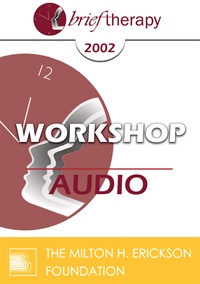
- Average Rating:
- Not yet rated
- Topic Areas:
- Workshops | Children and Adolescent Therapy | Communication | Brief Therapy
- Categories:
- Brief Therapy Conference | Brief Therapy Conference 2002
- Faculty:
- Insoo Kim Berg, MSSW
- Duration:
- 2:12:52
- Format:
- Audio Only
- Original Program Date:
- Dec 15, 2002
- Short Description:
- Working with children requires adaptations of techniques that depend on language skills. This workshop will describe useful language techniques that help to work with children briefly.
- Price:
- $15.00 - Base Price

- Average Rating:
- Not yet rated
- Topic Areas:
- Workshops | Anxiety | Depression | Happiness | Love | Relationships | Brief Therapy
- Categories:
- Brief Therapy Conference | Brief Therapy Conference 2002
- Faculty:
- Pat Love, EdD
- Duration:
- 1:40:50
- Format:
- Audio Only
- Original Program Date:
- Dec 15, 2002
- Short Description:
- To love and be loved. Sounds simple - yet for many it is one of life's most difficult challenges. Come and explore three major causes of unhappiness in relationships and gain a deeper understanding of how they are related.
- Price:
- $15.00 - Base Price
Please wait ...

